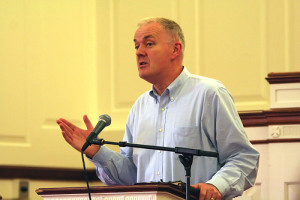the holy Christian people are recognized by their possession of the holy word of God.” Martin Luther always returned to the foundational importance of the Scriptures and the gospel in his approach to any doctrinal question. The church must have and cherish the revelation of God. “And even if there were no other sign than this alone, it would still suffice to prove that a Christian, holy people must exist there, for God’s word cannot be without God’s people, and conversely, God’s people cannot be without God’s word.”
Baptism
“Second, God’s people or the Christian holy people are recognized by the holy sacrament of baptism, wherever it is taught, believed, and administered correctly according to Christ’s ordinance.” The church possessed and administered the sacrament of baptism as taught in the Bible, a visible expression of the gospel.
The Lord’s Supper
“Third, God’s people, or Christian holy people, are recognized by the holy sacrament of the altar, wherever it is rightly administered, believed, and received, according to Christ’s institution. This too is a public sign and a precious, holy possession left behind by Christ by which his people are sanctified so that they also exercise themselves in faith and openly confess that they are Christian, just as they do with the word and baptism.” Again, the sacrament of the Lord’s Supper must be treasured by the church as Christ has taught it in the Bible.
Discipline
“Fourth, God’s people or holy Christians are recognized by the office of the keys exercised publicly. That is, as Christ decrees in Matthew 18[:15– 20], if a Christian sins, he should be reproved; and if he does not mend his ways, he should be bound in his sin and cast out. If he does mend his ways, he should be absolved. That is the office of the keys.” For Luther, the real church exercised discipline over its members. This element of Luther’s understanding has often been missed, but he was crystal clear about it.
Biblical Offices
“Fifth, the church is recognized externally by the fact that it consecrates or calls ministers, or has offices that it is to administer.” Luther recognized that the Bible established office in the church—not the sacral caste of priests—but the minister who faithfully preached the Word and administered the sacraments.
Luther’s focus on the simplicity and importance of the congregation came to quite radical expression, for his day, in his belief that in principle the congregation has the right to call its own minister. As early as 1523, he had written a treatise titled That a Christian Assembly or Congregation Has the Right and Power to Judge All Teaching and to Call, Appoint, and Dismiss Teachers, Established and Proven by Scripture. Ministers were not a mysterious order created and imposed by a hierarchy, but were to emerge from the congregation.
Worship
“Sixth, the holy Christian people are externally recognized by prayer, public praise, and thanksgiving to God. Where you see and hear the Lord’s Prayer prayed and taught; or psalms or other spiritual songs sung, in accordance with the word of God and the true faith; also the creed, the Ten Commandments, and the catechism used in public, you may rest assured that a holy Christian people of God are present.” The church was visible in its simple, Word-centered worship.
Suffering
“Seventh, the holy Christian people are externally recognized by the possession of the sacred cross. They must endure every misfortune and persecution, all kinds of trials and evil from the devil, the world, and the flesh.” Since the servant was not greater than the master, as Jesus had taught, the church would suffer in this world as it served Christ faithfully.
Luther derived these seven points from the first table of the Ten Commandments and recognized that, though these elements were never perfect in the church, they were truly present: “These are the true seven principal parts of the great holy possession whereby the Holy Spirit effects in us a daily sanctification and vivification in Christ, according to the first table of Moses. By this we obey it, albeit never as perfectly as Christ. But we constantly strive to attain the goal, under his redemption or remission of sin, until we too shall one day become perfectly holy and no longer stand in need of forgiveness.”
These seven characteristics were only the beginning of what could be said about the church. He said:
In addition to these seven principal parts there are other outward signs that identify the Christian church, namely, those signs whereby the Holy Spirit sanctifies us according to the second table of Moses… . We need the Decalogue not only to apprise us of our lawful obligations, but we also need it to discern how far the Holy Spirit has advanced us in his work of sanctification and by how much we still fall short of the goal, lest we become secure and imagine that we have now done all that is required. Thus we must constantly grow in sanctification and always become new creatures in Christ!


